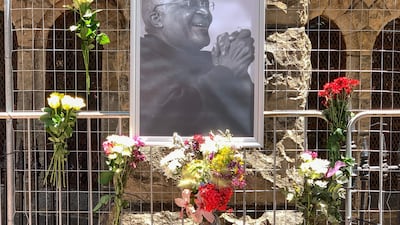Few moments in the latter stages of the 20th century were as closely watched around the world as the end of apartheid in South Africa. In 1994, South Africans switched suddenly from decades-long racial segregation to a political system with the capacity to be truly representative. It meant South Africa could go into the 21st century as a "Rainbow Nation", no longer a place where more than three quarters of its population were discriminated against at all levels by a small, white elite.
It was a lesson in forgiveness. After decades of tension, and not before some violence, the final stage of the transition was peaceful, largely down to visionary leaders who never wavered from the importance of keeping the country together and building an inclusive future.
Yesterday, Archbishop Desmond Tutu, one of these leading pioneers, died.
Born in 1931, Tutu was ordained in 1961 and made history when he became Johannesburg’s first black Anglican dean in 1975. He became archbishop, one of the highest offices in the Christian church, in 1986. He was a Nobel Prize laureate, along with other figureheads of the movement such as former presidents Nelson Mandela and FW De Klerk, all part of a generation of "outstanding South Africans who bequeathed a liberated South Africa", President Cyril Ramaphosa said after the news of Tutu's passing.
After Mandela's election in 1994, the first vote in which black South Africans could participate, Tutu was appointed head of the Truth and Reconciliation Commission, which investigated human rights abuses that took place during the apartheid era. While its main purpose was to gather evidence from victims and perpetrators on historic crimes, it did not set out to prosecute retrospectively. Rather, it sought to only establish the truth. It published its final findings in 2003.
Tutu summed up the approach in these lines: "When we see others as the enemy, we risk becoming what we hate. When we oppress others, we end up oppressing ourselves. All of our humanity is dependent upon recognising the humanity in others."
There was nothing easy or inevitable about this outlook. North of the border, in Zimbabwe, a government led by Robert Mugabe was descending into corruption and division that eventually saw the violent seizure of white-owned farms, a move that left Zimbabweans traumatised and with severe food shortages.
Having now lost two of their country’s chief architects – Mandela died in 2013 – younger South Africans bear a special responsibility to keep its peaceful development on track. This mission became particularly crucial in 2021. Widespread riots broke out in July, fuelled by poverty in a country where it is increasingly hard to find jobs. And while South Africa has come a great distance since the end of apartheid, the system’s legacy is often blamed for this lingering inequality.
Much work is still to be done, then. But for tough moments, South Africans will always have the example of leaders such as Tutu to remind themselves that a better, more peaceful way exists.



















